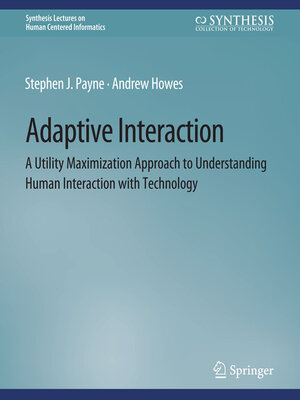Adaptive Interaction
ebook ∣ A Utility Maximization Approach to Understanding Human Interaction with Technology · Synthesis Lectures on Human-Centered Informatics
By Stephen J. Payne

Sign up to save your library
With an OverDrive account, you can save your favorite libraries for at-a-glance information about availability. Find out more about OverDrive accounts.
Find this title in Libby, the library reading app by OverDrive.



Search for a digital library with this title
Title found at these libraries:
| Library Name | Distance |
|---|---|
| Loading... |
This lecture describes a theoretical framework for the behavioural sciences that holds high promise for theory-driven research and design in Human-Computer Interaction. The framework is designed to tackle the adaptive, ecological, and bounded nature of human behaviour. It is designed to help scientists and practitioners reason about why people choose to behave as they do and to explain which strategies people choose in response to utility, ecology, and cognitive information processing mechanisms. A key idea is that people choose strategies so as to maximise utility given constraints. The framework is illustrated with a number of examples including pointing, multitasking, skim-reading, online purchasing, Signal Detection Theory and diagnosis, and the influence of reputation on purchasing decisions. Importantly, these examples span from perceptual/motor coordination, through cognition to social interaction. Finally, the lecture discusses the challenging idea that people seek to find optimal strategies and also discusses the implications for behavioral investigation in HCI.







